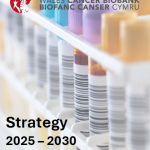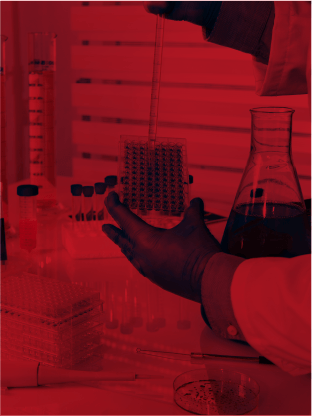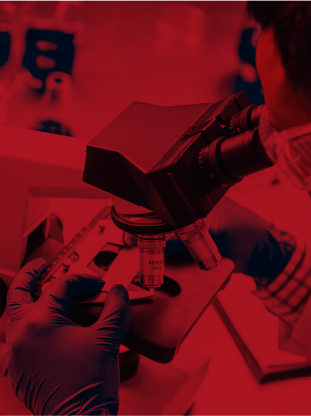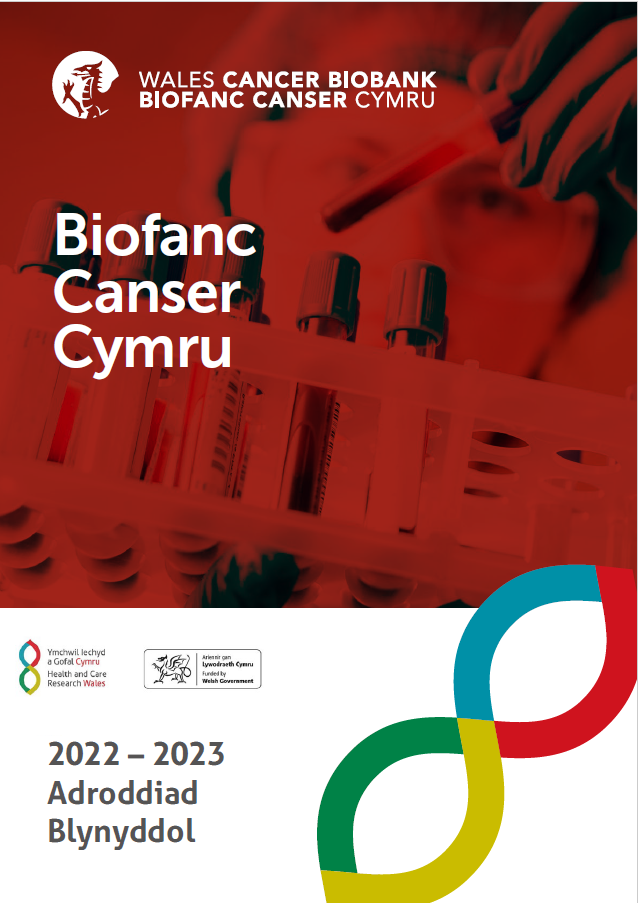New Strategy, New Operating Structure, New Vision for Cancer Biobanking
WCB Mission Statement
“To promote cancer research through leadership in the supply of biosamples, data and expertise to the international research community to drive innovation in Wales for the benefit of cancer patients globally.”
Wales Cancer Biobank has unveiled a comprehensive new strategy to drive future growth and innovation. This strategic roadmap, designed to enhance the organisation's competitive edge and deliver exceptional value to stakeholders, underscores a commitment to efficiency, advancements in technology, and researcher-focused transformations.
Embracing Digital Transformation
The cancer research landscape is constantly changing, and with the advent of new technologies, capable of extracting increasingly large amounts of information from cancer tissue donated by patients; access to quality-assured samples for research is becoming more important than ever.
WCB is committed to ensuring that we respond to the evolving needs from researchers for these high-quality tissue samples with accompanying clinical and molecular data. To do this, our new Strategy Document outlines how we will work more closely with cancer researchers and the NHS providing expertise, data linkage and state-of-art practices that are delivered in a sustainable way for the future security of patient sample-related research.

Professor Richard Clarkson, WCB Scientific Director says: - “Our vision for cancer biobanking seeks a new way of working through partnership and collaboration. This will ensure that researchers get maximum benefit from our expertise, and that they have access to samples with a wider array of associated clinical and ‘-omic’ data.”
Commitment to Efficiency
WCB has some big plans to help the Biobank become more sustainable going forward while also meeting our remit of ensuring patient donated tissues contribute to future cancer research in the most effective ways possible. Outlined in our Strategy Document, we propose a new vision for cancer biobanking in Wales, one in which biobanking processes are embedded within NHS and academic infrastructures, engage directly with research projects and funders and maximises its cost recovery activity through lean working.
Professor Richard Adams, WCB Clinical Director adds: “A sustainable biobanking future requires a collaborative approach that brings together all stakeholders, avoiding repetition of work and the embedding of biobanking structures and expertise in to focused research projects. We are fortunate to work in Wales with a range of partners that we believe can see this vision and share our goal.”
Meeting Researcher Needs
Recognising the evolving needs of cancer researchers, Wales Cancer Biobank is placing a strong emphasis on streamlining sample and data acquisition. WCB plans to work directly with researchers, funders and stakeholders; transforming the existing biobanking model and expanding its reach to the cancer research community across the UK and internationally.
“A dedicated biobank infrastructure with the associated approvals and specialist staff allows researchers to focus on the science and not spend valuable time and resource on regulatory requirements, ethics approvals and sample and data collection.”
Investing in Talent and Innovation
To drive innovation and maintain its competitive edge, Wales Cancer Biobank is investing in talent development and fostering a culture of creativity. The organisation plans to launch various training programs and initiatives to nurture the skills of its workforce, share expertise with researchers, and encourage innovative thinking.
“WCB is committed to a restructuring process over the period 2025-2030 that will provide the operational framework to increase its capacity and capability for delivery of high-quality biosamples and data to researchers in a sustainable manner”
Conclusion
With a clear vision and a robust strategy in place, Wales Cancer Biobank is poised for a future of sustained growth and success. By embracing digital enhancements, committing to an integrated, sustainable model, and investing in talent and innovation, WCB will be well-equipped to navigate the challenges of the research landscape and continue delivering value to its stakeholders.
“The culmination of these changes will be a new working model of biobanking that truncates the pipeline between patient and researcher, whilst offering a portfolio of state-of-art information to accompany the biological samples.”
Read the new WCB Strategy Document here
Farewell, Good Luck and Thank You Dr Alison Parry-Jones
Dr Alison Parry-Jones has made the brave decision to leave the Wales Cancer Biobank and Cardiff University to move closer to her family in London in a 'reverse escape to the country' venture!
Alison has been a huge name in biobanking for 20 years, having founded the Wales Cancer Bank (later rebranded as Wales Cancer Biobank) alongside colleagues from both Cardiff University and NHS Wales, in 2004. Since then, the biobank has consented over 17,000 patients, supplied samples to nearly 200 research projects across 10 different countries worldwide.
She is locally, nationally, and internationally renowned in the biobanking community, with a mind-blowing CV of influential positions and achievements across the globe! Most notably as both President and Director-at-Large for Europe, Middle East, and Africa region for the International Society for Biological and Environmental Repositories (ISBER); and being awarded the ISBER Special Services award for ‘An exceptional contribution towards the goals of the organisation’. The success of the Wales Cancer Biobank can be put down to the dedication of Dr Parry-Jones and the supporting team she has cultivated and nurtured across the years.
We are sorry to see her go, but grateful that she leaves WCB in a strong position with a bright and exciting future ahead of it as it continues to meet her original objectives for the Biobank, of providing unfettered access to cancer patients’ donated tissues for researchers across the globe.
If you would like to attend Alison's farewell event or contribute to a gift and card, please contact Abby MacArthur macarthura@cardiff.ac.uk
Wales Cancer Research Centre Conference 2024
By Ffion Edwards, Research Assistant, Wales Cancer Biobank
On 4th March, I attended the Wales Cancer Research Centre conference at the National Museum, Cardiff. Throughout the day, there were a number of interesting talks by guest speakers working in the field of cancer research.
I attended a ‘Cancer clinical trials’ talk, covering various ongoing studies that are being carried out with the aim of developing novel diagnostic tests or treatments for patients with cancer. One of which included the QuicDNA study, which is focused on the use of circulating tumour DNA testing within the diagnostic pathway for lung cancer. Other talks I attended included ‘Precision and mechanistic oncology’ and ‘Population health-based cancer prevention and early diagnosis’.
As well as the talks, there were several posters on display showcasing different areas of expertise among cancer researchers in Wales. There were also several exhibitor stands, run by partners of the Wales Cancer Research Centre and by conference sponsors. Some of these included the Wales Cancer Biobank, Health and Care Research Wales and The Centre for Trials Research.
Attending this conference was a great way to meet cancer researchers and to gain valuable insights into recent advances in cancer research in Wales.
Click here to read WCRC's full write up on the conference
WCB research nurse, Kevin, talks about our consenting process
My name is Kevin and I work for the Wales Cancer Biobank as a Research Nurse in UHW. 
My job involves seeing patients who are about to undergo surgery for removal of a tumour or suspicious growth and to see if they are willing to donate tissue and blood samples, along with permission to anonymise parts of their medical notes and add this to our secure database. I am based in the Urology Clinic and my role is to explain how the Wales Cancer Biobank works; how and when the tissue is taken; how and where it is stored; and who has access to it. If the patient is happy to go ahead, I consent them.
The aim is to find better ways of diagnosing and treating cancer, and researchers apply to access these samples of blood and tissue for permission to study them. I started work for the Wales Cancer Biobank in January 2009 and initially, as well as consenting patients, we also used to do some lab work processing blood samples. Recently we have started using iPads for consenting patients instead of paper consents which has made the job much easier for me and I think patients prefer it too, as well as saving on paper.
Some patients actually ask why I am asking them for a donation of blood and tissue, assuming that this was done automatically without having to ask permission. I do enjoy my job as a Research Nurse for the Wales Cancer Biobank.
In my spare time I enjoy a bit of gardening, running and I volunteer for Cruse Bereavement Support, supporting clients via phone and occasionally Zoom. I also help with Barney’s Small Dog Rescue; at present my partner and I are fostering 2 dogs until they find their forever home. I also play guitar in a Punk Band.
Ice Slice Baby; Exploring the Use of Ice Embedding for Frozen Sectioning in Biobanking
By Paola Foulkes, Wales Cancer Biobank
In October I had the opportunity to present a poster at the ISBER regional symposium hosted by the Biobanco del Sistema Sanitario Público de Andalucía in Granada Spain. The theme of this year’s meeting was focused on biospecimen science, research, and innovation. Over the two days I attended a series talks around the themes of human, environmental and microbial biospecimen science. There were also abstract presentations on a variety of engaging topics from seed biobanking to the first aerospace biobank, collecting samples from the SpaceX Inspiration4 Mission. I also took part in a round table about the preanalytical factors that impacts downstream genomics analysis of tissue samples. This was one of the highlights of the conference as I had the opportunity to learn from others in the field how different biobanks manage pre analytical variables, as well as contribute about the processes at WCB. Over the course of the conference, I met delegates from all over the world including Luxembourg, Kenya and Japan. There was also the opportunity to interact with companies exhibiting their latest biobanking equipment and technologies. Another highlight of the conference was the tour of the biobank at the end, along with winning the interactive quiz based on the conference talks.
Paola ISBER poster








